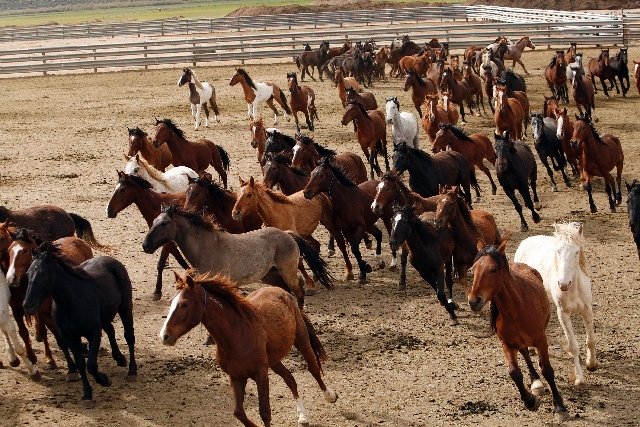1,300 wild horses, burros targeted
RENO — U.S. Bureau of Land Management officials say they plan to remove only 1,300 wild horses and burros from the range across the West this summer because of budget constraints and overflowing holding pens.
Overall, they intend to remove about 4,800 of the animals from the range during the current fiscal year ending Sept. 30, compared with 8,255 in the last fiscal year. The vast majority of targeted animals will be wild horses.
Nine of the BLM’s 16 summer roundups will be in Nevada, home to roughly half of the estimated 37,000 free-roaming wild horses and burros in the West. The agency plans to remove 855 wild horses and burros in Nevada, 140 in Oregon, 105 in Arizona, 65 in New Mexico, 50 in Colorado and 25 in Idaho.
The BLM made the announcement Friday, about a month after 30 U.S. representatives urged new U.S. Interior Secretary Sally Jewell to make reforming the government’s wild horse management program and its spiraling budget a priority.
The American Wild Horse Preservation Campaign coalition criticized the BLM’s plans, saying the captured animals will be added to government-funded holding facilities that are at capacity with 50,000 wild horses and burros.
“The BLM is galloping ahead with rounding up more wild horses, despite the high cost to taxpayers and animals as well as the findings of an independent scientific review, which recommends against continued roundups,” coalition spokeswoman Suzanne Roy said in a statement. “The agency still has not gotten the message that the removal of wild horses from our Western public lands is inhumane, unsustainable, unscientific and must come to an end.”
BLM spokesman Tom Gorey said most of the upcoming “gathers” have been scheduled in response to emergency conditions spurred by drought, and by public safety issues related to animals that roam near highways and residential and agricultural areas.
He said the schedule is subject to change because of continuing drought conditions that are resulting in limited water and forage for wildlife, livestock, and wild horses and burros.
“BLM managers are monitoring animal and range conditions, reducing livestock grazing, enacting fire restrictions and providing supplemental water in some locations for wild horses,” Gorey said in a statement.
Six roundups in Nevada will use helicopters to guide the animals to pens, while the rest of the operations will use bait and water to trap them in corrals.
The BLM has no plans to administer fertility control vaccines to horses this summer except for some mares in Colorado, Gorey said. Instead, the agency intends to use fertility-control treatments during roundups before breeding season, between November and February, when the vaccines are most effective.
An independent scientific review of horse roundups, released in May, recommended that the government invest in widespread fertility control of the horses and let nature cull any excess herds instead of spending millions to house them in overflowing holding pens.
The 14-member panel assembled by the National Academy of Sciences’ National Research Council and Management concluded BLM’s removal of nearly 100,000 horses from the Western range over the past decade is probably having the opposite effect of its intention to ease ecological damage and reduce overpopulated herds.
By stepping in prematurely when food and water supplies remain adequate, BLM is producing artificial conditions that ultimately serve to perpetuate population growth, the committee found.

















